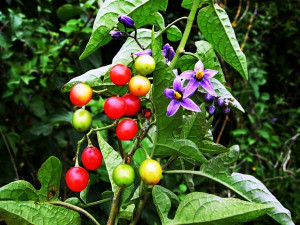In homeopathic medicine, dulcamara is used to purportedly cure a wide variety of ailments.
Contents
Uses
- Most of the uses of the plant are associated with homeopathic medicine. This practice involves taking a natural approach to healing, in which a remedy is meant to bear certain similarities to the ailment is it used to cure. An analogy in Western medicine may be found in the diluted use of the influenza virus in flu vaccinations. Homeopathic remedies, including the use of dulcamara, involve using diluted amounts of natural remedies and only taking one remedy at a time for an ailment.
Benefits
- The plant is used for those who show signs of sensitivity to coldness and dampness or who may be susceptible to fevers, asthma, pneumonia, and certain skin conditions. Homeopathic practitioners may also recommend dulcamara for those who exhibit dominant or strong-minded personality traits.
- The plant can be either ingested or used topically, depending on the ailment it is relieving. For rheumatism, a weak dulcamara tea may be taken three times a day.
- For those who suffer from certain skin conditions, the herb can be boiled in and discarded from water, and the patient can then use this water to wash his or her skin. Extracts are also available to be taken topically or ingested after a drop is added to a beverage. These extracts are mainly used to relieve inflammation, pain, and even anxiety.
Cautions
- The STEM of bittersweet nightshade might be safe for most adults. But, the LEAVES or BERRIES are UNSAFE, and are very poisonous. Symptoms of poisoning include: scratchy throat, headache, dizziness, enlarged eye pupils, trouble speaking, low body temperature, vomiting, diarrhea, bleeding in the stomach or intestines, convulsions, slowed blood circulation and breathing, and even death.
Interactions
- Not enough information is available. Please consult with your pharmacist.
Other names
Amargamiel, Bitter Nightshade, Bittersweet, Blud Nightshade, Common Nightshade, Deadly Nightshade, Douce-Amère, Dulcamara, Fellen, Fellonwood, Felonwort, Fever Twig, Herbe à la Fièvre, Herbe de Judas, Herbe de Judée, Kakmachi, Morelle Douce-Amère, Morelle Grimpante, Mortal, Rubabarik, Scarlet Berry, Snake Berry, Solanum dulcamara, Staff Vine, Vigne de Judée, Violet Bloom, Woody, Woody Nightshade
References
WiseGeek, http://www.wisegeek.com/what-are-the-medicinal-uses-of-dulcamara.htm

